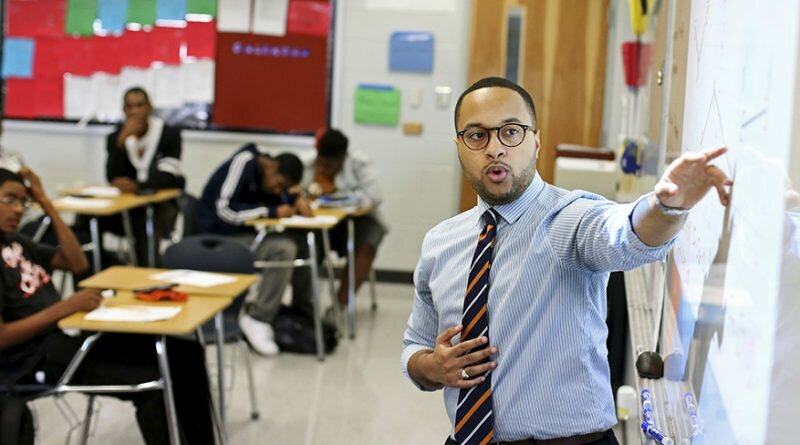Black Teachers Placed In Low-Performing Schools
Black teachers in the United States find themselves in a precarious situation as they continue to battle canker of discrimination in education.
Students of all colors prefer Black teachers, Atlanta Black Star stated. Black students are suspended less; given more opportunities for gifted programs; are less likely to be placed in remedial education; and generally are not disciplined so harshly when they have Black teachers. And even though many recent studies have shown that Black teachers help Black students (and other students of color), doing so actually hinders the teachers’ career development, according to a new study.
Despite the increasing diversity of the nation’s classrooms — with non-white children now making up the majority of public school students — teachers of color make up only 18 percent of the nation’s teacher population, and Black teachers are only 7 percent of that population. And despite the already miniscule numbers, Black and otherwise non-white educators are leaving the teaching profession at much higher rates than their white counterparts.
The study is from The Education Trust, a national nonprofit advocacy organization, and performed by researchers Ashley Griffin and Hilary Tackie. Griffin and Tackie’s report specifically explains why Black teachers are more likely to leave the teaching profession. The researchers used a focus group of 150 Black teachers and chose the participants to coincide with the various experience levels and teaching environments of Black teachers in the U.S.
“We’ve read many clips about the low number of African-American teachers and low recruitment figure,” Griffin told NewsOne. “But no one is really talking about retention. So we set out to listen to African-American teachers and have conversations about what’s happening across the nation.”
The Educational System is Putting African-American Teachers in Failing Schools, Expecting Them to be Miracle Workers https://t.co/TRP8r5H5LS
— Atlanta Black Star (@ATLBlackStar) November 10, 2016
The researchers found several patterns, according to NewsOne . Among them: One of the most common reasons schools were excited to hire Black teachers is for their (sometimes assumed) ability to work well with Black students, which made their careers tread water. The other non-Black educators were allowed to move on and take on different and more challenging work (such as teaching Advanced Placement courses, for example), while Black teachers revealed they were made to continue teaching low-performing students and to assume disciplinary roles.
Many of the teachers reported that because of these relationships, they were often in a unique position to deal with students with behavioral challenges, a fact that often led to them taking on disciplinarian roles.
The research found amazing similarities and continuity. It paints a picture that explains why the teachers entered the profession, the value they bring to schools, and the obstacles they face.
Many of the teachers said they felt “called” to teaching. They came to the profession with high expectations of their Black students and a desire to enable them to succeed. This calling, Griffin explained, often stemmed from a role model—a teacher or a relative.
One participant, an elementary school teacher from Oakland, said she wanted to impact her Black students in the same way that her fifth-grade teacher influenced her.
She said, “I make sure I get to know each and every one of my kids, and let them know that they can do it.”
The teachers said they feel a special connection with their Black students. “We bring familiarity to our students,” one participant said. “You know, they do like to look up and say, ‘Oh, OK, there is my auntie,’ or ‘There is my grandma,’ or ‘There is my cousin.’”
This connection, stemming mainly from common experiences, enables the teachers to empathize with the challenges their Black students encounter away from school.
However, there are negative consequences for this affinity with the students. These consequences diminish their chances of getting promoted and recognized for their skills.
School administrators often assign African-American educators to teach only Black students. As a result, White colleagues tend to view them as disciplinarians, but not skilled educators.
Many of the teachers said they spend nearly all their time playing the role of enforcer instead of developing their teaching skills and doing lesson planning.
Stereotyped as less educated, the Black teachers said they seldom get the opportunity to teach high-performing students and advanced courses, which would give them recognition as subject matter experts.
A focus group participant described getting pigeonholed as a disciplinarian of Black students this way:
“You do it so well, let’s just keep you here.’ If I’m doing the ABCs every day, I never really get to do anything of a higher caliber. I think a lot of times, as African-American teachers, we get stuck in a certain group, because you do it well.”
Griffin said the Black teachers told her team that they have unique stressors. Much of it stems from a sense of obligation to underserved Black students, which goes beyond academics.
They often find themselves “acting as a parent, a hairdresser, a chauffeur, an advocate, a counselor, or a cheerleader,” the study said. Serving the whole student often means spending their own money to ensure the students have basic necessities.
Article touching on fixing things at the foundation level before building education systems: https://t.co/4sg6QqcwFD
— Clarissa Hamlin (@ClarissaHamlin) November 7, 2016
This practice seems to be strategically aimed at making the job of Black teachers extremely difficult and sometimes almost impossible. Thus the racially motivated approach not only affects the careers of the teachers but also has a terrible upshot on their self-esteem. Moreover, it undermines the authority of the African-American educators in the eyes of their students. It is unacceptable to corrupt the entire education system because of racial bias. This puts the future of the nation in jeopardy. Educational racism is the worst thing that can ever happen to us.






